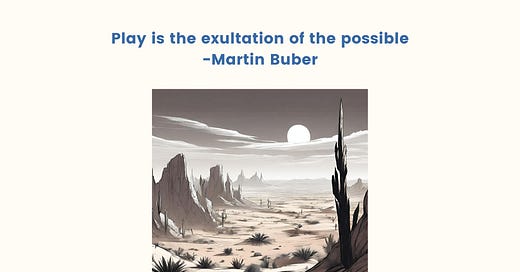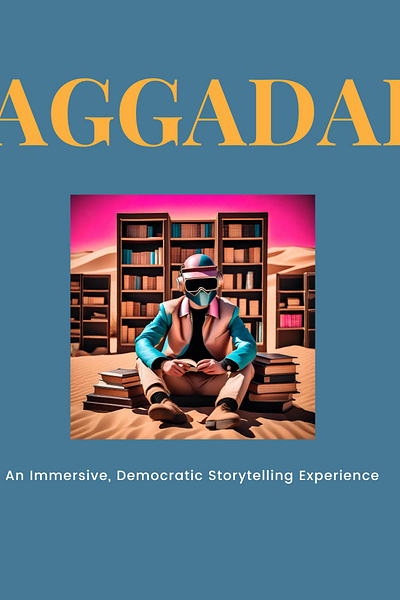Listen to today’s episode of Judaism Unbound, and find a free, experiential, democratic haggadah (guide to the Passover seder) here1:
As those of us who celebrate Passover make our last-minute preparations before the first Seder this Saturday night (and those of us expecting babies any day now create contingency plans galore), I've been thinking about what it means to turn our attention to freedom for eight days.
More specifically, I’ve been thinking about the valence and character of freedom and how my understanding of it has transformed over the course of my life, and how that might deepen the big question I find myself returning to again and again—once one is free, what ought they to do with it?
When I was in my twenties, I spent a lot of time traveling the country, visiting different types of communities, meeting new people, and pursuing my curiosities as they came (I’ve written about this in more detail in other posts). I did not have a lot of money so was not without material constraints, but generally I experienced what most would identify as a profound amount of freedom. At the same time, as I remember those years, I was often overwhelmed by equally profound angst, beset by a litany of existential questions I couldn’t answer: what was I doing and why, where would all this wondering lead me to, would I find someone to love who loved me back, would I have a family, would I find a stable place in society.
Now that I’m settled in a home with a wonderful partner, a baby on the way, a job I find meaning in, and a writing habit I can’t kick, I don’t have the same individual freedoms I did in my twenties, though I also have a lot less angst (at least in the areas I did back then). I believe I am no less free, and I’m wondering how to understand this transformation of freedom so that I might better live within the question of what to do with it.
A scarcity freedom vs. an abundant freedom
As we find ourselves in a moment of crisis on multiple levels—in the Jewish world, in the American experiment, as a global society—I’ve been increasingly thinking about the cultural chasm that’s opened between those who default into a scarcity mindset and those who aspire towards an abundance mindset.
I think each provides a lens on freedom that’s helpful to unpack.
In a culture of scarcity, there is, at times, the kind of freedom I experienced in my twenties. Such freedom was defined by what was absent—freedom from obligations, from constraints, from commitments. That was undoubtedly valuable in its way, allowing me to explore and discover and learn as I was collecting experiences, pursuing surprise, and generally letting the container that was created by my scarcity become the metaphorical vehicle through which I traveled.
And yet, such a freedom in scarcity is both limited and limiting. Limited in that I was confined by my ability to only care for myself. I didn’t have the resources to care for others, which meant I couldn’t take on the responsibility of certain commitments even when I wanted to. Indeed, a culture of scarcity, even a free one, will most often lead to every person feeling responsible primarily, and often solely, for themself. From there, when they can momentarily look beyond immediate self-interest, they might extend responsibility to their family and tribe—but rarely beyond these boundaries.
So what of the freedom in an abundant culture? Maybe it’s counterintuitive, but I think in a culture that understands its own abundance, freedom feels like an opening for taking more responsibility. As I’ve had the opportunity to take on commitments and embrace responsibilities—to my partner, to my soon-to-arrive child, to my community—it feels to me that not only has my freedom not diminished, it’s transformed into something richer. With less scarcity and more abundance, responsibility becomes a source of dignity, and dignity feels like the deeper signal of some freedom achieved.
In “The Prophets,” Abraham Joshua Heschel wrote—
…that morally speaking, there is no limit to the concern one must feel for the suffering of human beings, that indifference to evil is worse than evil itself, that in a free society, some are guilty, but all are responsible
I think Heschel’s notion is a reminder of this different, deeper understanding of freedom. Not a freedom of scarcity but a freedom of abundance. In an abundant free society, we are all responsible because we have the space to live within the question of how to shoulder that responsibility most effectively. In such a culture, we have the ability to dwell in uncertainty, to explore possibilities without rushing to predetermined answers.
As an example, we can see the contrast in our approaches to immigration. A scarcity freedom perspective views migrants primarily as competitors for limited resources—jobs, housing, social services—and focuses on protecting what "we" have from "them." An abundant freedom perspective instead recognizes that welcoming the stranger not only fulfills a core Jewish value but often strengthens communities through new perspectives, cultures, and contributions. Sometimes this means we have to stand up and push back, to protest, to protect our neighbors. The former approach contracts our circle of concern; the latter expands it.
I think what we are experiencing right now under the Trump administration and the rise of authoritarians around the world is the entrenchment of scarcity freedom. And as we’re seeing, when entrenched, such an approach ultimately leads to freedom’s erosion. Fear and its protective mandate push us to close off our questioning minds. Certainty feels safer than curiosity in precarious times. We become less willing to sit with discomfort, less able to hold complexity, less inclined to see beyond our immediate needs.
A new haggadah
The haggadah I linked at the top transforms the traditional seder into a more playful, interactive experience designed to help us sit with the question of what we, collectively, want to do with our freedom. Rather than simply recounting an ancient story, it invites participants to actively engage with the possibilities and responsibilities that freedom entails—to live, if only for one evening, in the questions themselves.
A truly free society empowers us to care for others. This stands in stark contrast to survivalist individualism, which masquerades as freedom while subtly directing us toward self-protection and personal advancement above all else. When we lose the ability to question this narrow definition of freedom, we lose something essential to our humanity: our capacity for collective imagination and care.
Our ancestors' exodus from Egypt wasn't merely about escaping oppression—it was about creating a community that could continually question and reimagine what freedom might mean. When we read "Let all who are hungry come and eat" in the haggadah, we're reminded that our freedom is meaningful only when extended to others.
As we sit at our Seder tables this year, perhaps we might consider: How can we keep our questioning minds alive? How might we use our freedom not just for ourselves, but for the benefit of those around us? In this moment of crisis, how might we move to use the freedoms available to us to strive for a better world for all? To think of freedom as an opportunity to do for others more than a bare minimum for survival?
May we all find rest and solace in the company of friends and family, to tell the stories and myths of an ancient people full of flawed human beings doing their best in extraordinary times, and may we be refreshed in the memory of experience of liberation for another year.
Cited or referenced:
Previous posts:
If you’re here after listening to my guest spot on Judaism Unbound: Welcome! Please feel very free to download the haggadah and use it in whatever way you like. And subscribe for more posts!






